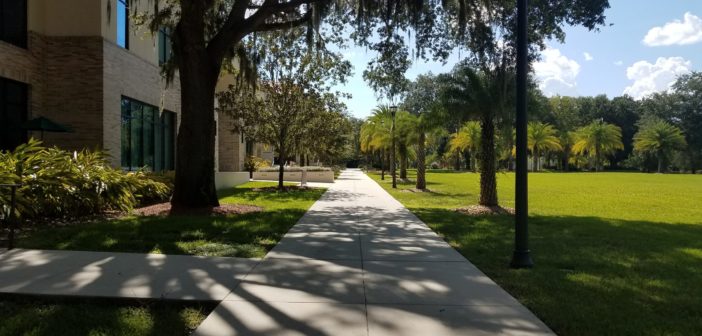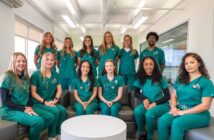By Tayhana Taylor, World News Editor
Last year at this time, students were preparing to enter the University with masks, social distancing, and hybrid classes. During the spring semester, a vaccine was implemented and, after a challenging year, everyone headed home for the summer with the vision of an end to COVID-19. Then, the delta variant hit. A year later, as students return to school, masks and limited social distancing are back.
Taking into account the new COVID-19 health guidelines from the Centers for Disease Control and Prevention (CDC), the University has entered stage three of its COVID-19 plans. The stage three framework covers protocols related to mask mandates, social distancing, health status checks, and vaccination.
Like the last academic year, masks will still be mandated for all students, faculty, and staff while indoors in a public setting, whether vaccinated or unvaccinated.
“Being a fully vaccinated student, I do feel safer knowing that the school is requiring both vaccinated and unvaccinated students to wear masks,” said Ashley Tucker, a sophomore majoring in criminalistics. “I think everyone wearing masks will limit the spread of the virus and keep us all safe.
According to the CDC, a face mask that covers the mouth and nose can block the release of virus-filled droplets into the air when a person coughs or sneezes, so multi-layer cloth masks “block up to 50-70% of fine droplets and particles and can slow those particles…not captured.” Therefore, masks will help reduce the transmission of the virus throughout campus.
“When there is a high level of mask-wearing, it increases safety for everyone. But if your health allows you, get vaccinated because that is the single most important thing you can do to protect yourself and everyone,” said Dr. Melanie Storms, senior vice president of Saint Leo University.
The University can only encourage students to get vaccinated; they cannot mandate it.
In April Florida Governor Ron DeSantis passed executive order 21-81 which prohibits schools from mandating the COVID-19 vaccine. Section 1 of the executive order reads, “No Florida government entity, or its subdivisions, agents, or assigns, shall be permitted to issue vaccine passports, vaccine passes, or other standardized documents for the purpose of certifying an individual’s COVID-19 vaccination status to a third party, or otherwise publish or share any individual’s COVID-19 vaccination record or similar health information.”
Thus, Saint Leo University does not have the authority to make it compulsory for members of the school community to get vaccinated or to disclose their vaccination records.
“If we limit services in any way to vaccinated or unvaccinated students, we would be in jeopardy of losing any state funding that comes to our institution—that includes the Florida EASE grant,” said Storms. “Students would also lose their eligibility for the grant if we put a vaccine mandate in place,” The Florida EASE grant offers tuition assistance to resident undergraduate students attending an eligible private, non-profit Florida college or university.
However, as a way of rewarding students, staff, and faculty for taking the extra step to protect the school community by getting the vaccine, Saint Leo University will be offering incentives to members of the school community.
Vaccine incentives for students include weekly prize drawings for tickets to Disney World and Halloween Horror Nights, and gift cards to the University dining campus locations. For faculty and staff, the prizes include a day off, two Universal Studios Florida tickets, a Benedict’s Coffeehouse gift card, and many more prizes and surprises. Winners will be contacted via phone call so that their health records remain confidential.
To be documented as fully vaccinated, students must show proof by submitting an email photo of their vaccination card to health.center@saintleo.edu. Staff and faculty may submit their vaccinated record to Human Resources via email at HR@saintleo.edu to attest they are fully vaccinated. Those who choose not to submit their vaccination records to the University will be treated as unvaccinated and, therefore, subjected to randomized testing.
“The randomized testing procedure for unvaccinated students, staff, and faculty are still under development,” said Storms. “Student-athletes are required to participate in a surveillance testing that is a part of the NCAA protocol—the testing will be on a rotating basis.”
For those who are not yet vaccinated, but would like to get vaccinated, the University has implemented a vaccine clinic on campus.
The vaccine clinic will be on September 8th and 9th in the Boardroom located in the Student Community Center. Vaccines will be administered by the staff at the University’s Student Health Center. An email will be sent out to students with a link to register—vaccines will be administered by appointment only. Both doses of the Moderna COVID-19 vaccine are free of cost. Members of the campus community may visit https://www.saintleo.edu/vaccine-clinic for more information or contact covid19commandteam@saintleo.edu via email if you have additional questions.
A change from last year will be the ability to interact more with fellow students, faculty, and staff.
Social distancing is no longer mandated. Large gatherings are limited to 50 persons and all individuals present must be wearing a mask. Therefore, students will have the opportunity to engage more in club activities and events held by the Campus Activities Board (CAB).
Health status checks are also no longer required. Instead of daily health status check-ins via the Saint Leo mobile app, students, faculty, and staff members are required to report any signs or symptoms of COVID-19 they may notice to the Student Health Center.
“I would encourage people to be mindful of their own wellness, take symptoms seriously, and always seek help from the health center,” said Storms.
Students who may, unfortunately, contract the virus will be required to quarantine at home if they reside in the state of Florida. Students who are vaccinated and come in contact with someone who has COVID-19 do not need to quarantine unless they test positive. Unvaccinated students will still need to quarantine if they encounter someone who has COVID-19.
Necessary accommodations will be made for students and faculty in the instance they contract the virus.
“In event of a student or faculty being told to quarantine, the connected classroom option will be made available for that period of time,” said Storms. The University has plans in place to support students and faculty if they cannot attend in-person classes due to contracting the virus. If a faculty member is well enough to teach, the virtual option will be made available to them; if not, a substitute will be provided for that time frame.
Some students may be worried or uncertain about the spread of the virus since the campus will be completely open, but Storms believes the University is well-prepared after last year’s experience with COVID.
“I feel as though we are very well prepared; we had over 80 percent of our student population on campus last year,” said Storms. “This is our second year managing COVID-19 on campus […] and we have a great system in place on how to manage health and wellness.”
Members of the pride can read more about Saint Leo’s COVID-19 and stay up to date by visiting https://www.saintleo.edu/protect-the-pride.





